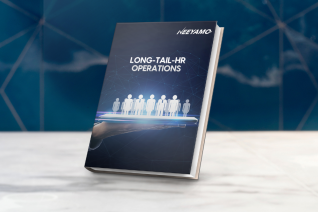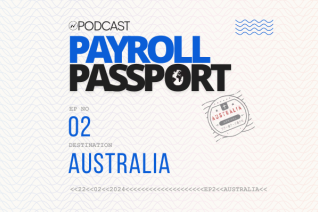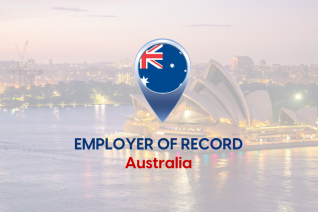Establish your presence globally with Neeyamo as we help you go beyond borders to manage your global payroll and hire new talent in Australia.
Overview
When you think of snow, Australia isn't the first place that comes to mind, is it? Why not? The Australian Alps receive more snowfall than the Swiss Alps in a year, but if you're looking for a warmer trip, Australia has thousands of beaches you can visit. More specifically, Australia has almost 12,000 beaches, which means that if you go to one beach every day, it would take 32 years to cover all the beaches in the country.
Do your organization's expansion plans require you to hire employees in Australia? Do you lack a physical entity in the country – a key requisite to hire local talent? Neeyamo – Global payroll providers, provide easy global payroll and assist organizations worldwide with onboarding and managing employees in Australia, processing payroll, managing local compliance requirements, benefits, and more.
Our Presence
Tools And Instances
Facts And Stats
Capital
Canberra
Currency
Australian Dollar (AUD)
Official Language
English
Fiscal Year
01 July - 30 June
Date Format
DD/MM/YYYY
Country Calling Code
+61
Time Zone
Australian Eastern Standard Time (AEST -UTC+10), Australian Central Standard Time (ACST-UTC+9.5), Australian Western Standard Time (AWST-UTC+8)
Global Payroll
Overview
Handling payroll for a widespread workforce can pose a significant challenge for any organization, and the added complication of compliance can worsen things. If companies spend more time processing payroll, it directly impacts day-to-day operations and their overall productivity. The solution to this problem is a Global Payroll Outsourcing company.
Over the years, Neeyamo has observed these complexities and strived to provide a global payroll solution through a single technology platform - Neeyamo Payroll. Neeyamos global payroll services ease the process for companies looking to outsource their global payroll requirements and aid them in maneuvering the tricky payroll system in Australia.
Neeyamo's Payroll 3.0 has set in motion the era of single-touch payroll, which simplifies and accelerates the pace of the payroll process. Neeyamos payroll software provides the perfect solution for all your global payroll needs – for employees working in primary geographies, the long-tail region, remote or internationally located.
What is Global Payroll?
Global payroll is the management of the entire payroll function of an organization across all countries of operation. Organizations use a single solution capable of doing this from one central location.
Payroll Associations
The Global Payroll Association (GPA) and the Australian Payroll Association are instrumental in supporting individuals and organizations engaged in payroll and its related functions. These associations offer many advantages that foster professional growth, facilitate networking prospects, encourage knowledge exchange, and promote industry advocacy.
Payroll Taxes
What is Payroll Tax?
Payroll tax is the percentage amount retained from an employee's salary and paid to the government to invest in the general population's welfare. These are statutory in nature and are levied from both the employer and employee. Additional statutory contributions are made by employers towards aiding both short-term and long-term benefits for their employees.
Employee Taxes
The personal income tax rates in Australia for the 2023-2024 financial year are structured as follows:
Residents:
| Income | Rate |
| Up to AUD 18,200 | No tax is charged. |
| AUD 18,201 to AUD 45,000 | Taxed at 19% on income exceeding AUD 18,200 |
| AUD 45,001 to AUD 120,000 | Taxed at 32.5% on income exceeding AUD 45,000, plus a base tax of AUD 5,092. |
| AUD 120,001 to AUD 180,000 | Taxed at 37% on income exceeding AUD 120,000, plus a base tax of AUD 29,467. |
| AUD 180,001 and over | Taxed at 45% on income exceeding AUD 180,000, plus a base tax of AUD 51,667. |
Additionally, from 1 July 2024, the tax rates will change to:
| Income | Rate |
| AUD 18,200 to AUD 45,000 | Taxed at 16%. |
| AUD 45,001 to AUD 135,000 | Taxed at 30%. |
| AUD 135,001 to AUD 190,000 | Taxed at 37%. |
| AUD 190,001 and over | Taxed at 45%. |
Non-residents:
| Income | Rate |
| Up to AUD 120,000 | Taxed at 32.5% on income exceeding AUD 0, with no tax on income up to AUD 120,000 |
| AUD 120,001 to AUD 180,000 | Taxed at 37% on income exceeding AUD 120,000, minus AUD 39,000 |
| AUD 180,001 to AUD 61,200 | Taxed at 45% on income exceeding AUD 180,000, minus AUD 45,000. |
From 1 July 2024, for non-residents, a 30% marginal tax rate will apply to taxable income up to AUD 135,000, and a 37% marginal tax rate will apply up to AUD 190,000, after which the top marginal tax rate of 45% applies.
It's important to note that these rates do not include the Medicare levy of an additional 2% of taxable income, which applies to most residents. There are also special rates for working holiday makers and tax offsets available for eligible individuals.
These tax rates are part of Australia's progressive tax system, meaning the tax rate increases as income rises. The tax brackets have remained largely unchanged since the 2019-20 financial year, with adjustments made primarily through tax cuts and adjustments to the Medicare levy.
Employer Taxes
Employer Payroll Contributions
- Payroll Tax - 5.45%
- Medicare - 2.00%
- Superannuation - 11%
The Superannuation Guarantee contribution will help individuals accumulate higher superannuation savings over time, potentially improving their financial security in retirement.
Payroll Cycle
Overview
Undoubtedly, payroll is a critical process for any organization. The pay cycle in Australia refers to the period for which an organization pays its employees, and this can vary depending on the pay frequency that the organization chooses to adopt.
Frequency
In Australia, employees are paid weekly, bi-monthly, or monthly. There are no legal requirements that govern the pay schedule. However, in Australia, it is common to pay employees by the following schedule:
Monthly - By 28-30 of the month, Bi-Weekly - Every second week on any agreed day (Usually Wednesday or Thursday), Bi-Monthly - Every 15th and 30th of the month.
13th Month Cycle
13th month pay cycle is not mandatory in Australia.
Global Work
Overview
Employer of Record services provider (EOR) helps you eliminate the hassle of handling complexities while onboarding a new employee in an international location. They help bridge the gap that otherwise mandates organizations to have a local registered entity and a local bank account before making a job offer to an international hire.
An EOR service provider acts as a legal employer, facilitates salary payments, and manages other statutory requirements such as health insurance, payroll taxes, and employee benefits, ensuring compliance with local tax laws and regulations.
This allows organizations to focus on collaborating with the employees in Australia for operational tasks, with the knowledge that they have a cost-effective solution to support their global payroll & HR requirements as they continue their global expansion.
Neeyamo’s Global Payroll Tech stack provides all the benefits of our Employer of record – payroll services in one solution.
HR Mandates and Practices
Minimum Wage
The Fair Work Commission (FWC) of Australia has announced a 3.75% increase in the national minimum wage, set to take effect from July 1, 2024. This decision aims to support the Reserve Bank's efforts to keep inflation within the 2-3% target range by 2025.
Key Details:
New Rate: The new minimum weekly rate is A$915.90 equivalent to A$24.10 per hour. This represents a moderate increase compared to the 5.75% rise observed in the previous year.
Affected Workers: Approximately 2.6 million workers, constituting 20.7% of the labor force, will be impacted by this change.
Overtime
Minimum employment conditions are outlined in the Fair Work Act, 2009, and Industrial Awards. These awards are either industry-based or occupation-based. Employees covered by such awards are generally paid overtime. With effect from March 23, 2023, it was deemed that employees who work completely or mainly in a managerial role are not covered by the PE Award.
With effect from September 16, 2023, changes were made to the PE Award's overtime and hours of work clauses to correct disparities between full-time and part-time/casual employees.
Most awards provide for overtime to be paid for time worked for more than 38 hours per week or more than 10 hours per day. If an employee works on a weekend or a public holiday, overtime or a penalty is generally paid to award-based employees.
If an employee is not an award employee, they are "Award-Free." These employees do not have a statutory right to be paid overtime. However, such employees have the right to work only 38 reasonable additional hours per week.
There is no formal definition of "reasonable additional hours." These employees are generally expected to work overtime depending on their job requirements.
The new overtime, time off in lieu, penalty rates, and record-keeping rules do not apply when an employee is legally entitled to a yearly wage that exceeds the minimum award amount by at least 25%.
New changes for employees who do not earn an annual salary that exceeds the minimum entitlements under the PE Award by at least 25%.
Data Retention Policy
Records may be held either physically or electronically.
Employment-related records, including tax records, generally must be kept for a minimum of seven years. Documents related to SG and FBT (fringe benefit tax) must be kept for seven years.
Tax records in Australia's territories generally must be kept for five years; however, the Australian Capital Territory requires that they be kept for seven years.
Certain employment records must be retained for seven years.
According to Australia's Fair Work Commission, employers must keep the following employee records for seven years:
- Name of the employer and name of the employee
- Australian Business Number (abbreviated as ABN), if any, of the employer
- Employee’s date of joining
- Employee’s employment type: full-time or part-time worker; whether permanent, temporary or casual
- Employee’s pay rate, including gross and net pay and deductions made
- bonuses, incentive payments, penalty rates, or entitlements
- Number of overtime hours worked
- hours worked if the employee works in casual or irregular part-time hours and is guaranteed pay in accordance to the time worked
- a copy of the written agreement pertaining to the employee's work hours
- a copy of any individual flexibility arrangements and a copy of separation/ termination, as applicable
Hiring and Onboarding Requirements
Hiring
There are no legislative schemes that specifically govern preferences in hiring. However, employers can actively encourage applications from members of disadvantaged groups to enhance diversity
An employer could seek to restrict recruitment to a designated group, for example, based on age or gender. In this case, the action must constitute a particular measure or positive discrimination under anti-discrimination legislation. An employer can also seek an exemption from the application of specific anti-discrimination legislation so it can have a targeted hiring preference.
Federal, state, and territory anti-discrimination laws and the Fair Work Commission (the FWC) prohibit discrimination based on specified attributes in recruitment, although the attributes differ under different legislative schemes.
By way of example, the Fair Work Act 2009 (the FW Act) prohibits an employer from taking adverse action against a prospective employee based on race, color, sex, sexual orientation, age, physical or mental disability, marital status, family or career's responsibilities, pregnancy, religion, political opinion, national extraction, or social origin.
Working Arrangement
With effect from June 06, 2023, an expanded category of employees will be eligible to request flexible work arrangements.
Onboarding
In Australia, The following documents are generally required to complete an employee’s onboarding processes
Employee's Personal Details (name, home address, postal address, personal phone numbers & emails)
- Proof of identification, for Australian citizens
- Australian citizenship certificate, for migrants
- Valid visa with permission to work
- Evidence of permanent residence (i.e., overseas passport)
- Employee Emergency contact details
- Employee Bank Account Details
- Driver's license, where applicable
- Tax File Number
- Superannuation details
- Medicare card
Probation
Probation periods are often implemented at the start of the employment relationship. An employer usually decides on the length of the probation period. It often ranges from 3 to 6 months from the employee’s date of joining.
Leave
National Holidays
January 1: New Year's Day
January 27: Australia Day
April 18: Good Friday
April 19: Day following Good Friday
April 20: Easter Sunday
April 21: Easter Monday
April 25: Anzac Day
December 25: Christmas Day
December 26: Boxing Day
The remaining holidays differ from state to state.
Sick Leave
Sick leave in Australia is also known as personal leave or carer's leave. Employees are entitled to 10 days of paid leave per year, which can be used if the employee is sick or if they need to care for a family member.
Maternity Leave
While some employers provide paid maternity leave, mothers are entitled to 12 months of unpaid maternity leave after working for 12 months with the same employer.
In addition, employees can apply to the Federal Government scheme, which provides payment for 18 weeks of maternity leave.
Paternity Leave
Fathers are entitled to five days of unpaid leave at the time of the birth or adoption of a child. Employees can also apply to the Federal Government scheme for additional leave.
Parental Leave
Parental leave includes maternity and paternity leave and leaves for when a child is adopted. An employee must have completed at least 12 months of employment to be eligible. Parental leave is unpaid leave that lasts for 12 months, and it is possible to request an additional 12 months from the employer.
Other Leave
- Annual Leave - For each year of service with their employer, an employee is entitled to 4 weeks of paid annual leave or 5 weeks of paid annual leave, if:
A modern award applies to the employee and defines or describes the employee as a shift employee for the National Employment Standards - Compassionate Leave - 2 days of paid leave
- Pre-Adoption Leave - 2 days of unpaid leave
- Paid family and domestic violence leave - All employees in the Fair Work system (including part-time and casual employees) will be entitled to 10 days of Leave in a 12-month period.
- Community Service Leave
- Long Service Leave
Termination
Notice Period
The grounds for dismissal can include capacity, performance, misconduct (including serious misconduct), and redundancy.
Severance Pay
Severance pay is given based on a continuous period of service, and the pay rate is given for ordinary hours worked:
- At least 1 year but less than 2 years: 4 weeks' severance pay
- At least 2 years but less than 3 years: 6 weeks' severance pay
- At least 3 years but less than 4 years: 7 weeks' severance pay
- At least 4 years but less than 5 years: 8 weeks' severance pay
- At least 5 years but less than 6 years: 10 weeks' severance pay
- At least 6 years but less than 7 years: 11 weeks' severance pay
- At least 7 years but less than 8 years: 13 weeks' severance pay
- At least 8 years but less than 9 years: 14 weeks' severance pay
- At least 9 years but less than 10 years: 16 weeks' severance pay
- At least 10 years: 12 weeks' severance pay
Visa
Overview
Several categories of permanent visas may be suitable for employees entering Australia for employment. Australia's immigration system is overseen by the government's Department of Home Affairs, which imposes specific qualification requirements on each visa type - these include provisions for employee sponsorship and professional skill level.
The key visas that are suitable for mobile employees entering Australia for work include:
Regional visas
Australia's regional visas are intended for skilled workers working in regional Australia. Employees must be nominated by an employer in Australia and meet skill, qualification, and language requirements.
The categories of regional visas are:
- Regional Sponsor Migration Scheme (currently closed to new applications)
- Permanent Residence (Skilled Regional Visa)
Skilled migration visas
Like regional visas, this type of visa is intended for skilled employees taking jobs in Australia with the nomination and sponsorship of their employers. Skilled migration visas are available in the following categories:
- Employer Nomination Scheme visa
- Skilled Independent visa (available to New Zealand citizens)
- Skilled Nominated visa
- Skilled Regional visa (for employees who have previously worked in Australia on an eligible visa)
Global Talent visas
This is for employees who have international recognition in an eligible employment field. The Global Talent visa requires the nomination of an Australian (or New Zealand) permanent resident, citizen, or Australian organization.
Employers should seek advice from an immigration specialist to ensure that the visa they are considering is the most appropriate based on the facts and circumstances of each case
Requirements for Visa
- Provide the pages of your current passport showing your photo, personal details, passport issue, and expiry dates.
- Also provide proof of a change of name if applicable
- For the TSS skills assessment by Trades Recognition Australia, you must have the skills assessment reference number. Your application is not valid if it is not provided.
- Qualification certificates (professional and educational).
- References from previous employers must cover a period long enough to show the needed skill level and experience.
- Your curriculum vitae (CV) or resumé should cover at least the last five years and showcase:
- Full employment and educational history
- Dates and positions held
- The name, title, and contact details of referees
- That you meet the two years' work experience if this applies.
- English language competency as required by the labor agreement
You will need to provide evidence of adequate health insurance for you and any secondary applicants for the duration of your stay in Australia.
Employee Background Checks
Legal and Background Checks
Background checks are generally permissible in the Australian employment law context to the extent that the checks are necessary to ascertain a candidate's ability to fulfill the role. Police records and working-with-children checks are generally mandated for positions that involve working with vulnerable individuals
Other justifiable circumstances include checks regarding honesty and integrity, for example, when an employer seeks to engage an individual in a role that involves responsibility for significant financial transactions. Some legislative schemes in Australia specify the circumstances in which convictions are no longer considered, commonly referred to as 'spent convictions' regimes. Also, some roles in certain organizations require specific security clearances.
Background checks that do not carry some form of justification run the risk that they will be considered discriminatory or an infringement of the individual's privacy, irrespective of whether they are conducted directly by the employer or by a third party as the employer's agent.
Background screening covers issues such as job applicants' education qualifications, previous employment, health/medical condition, criminal records, and even online /social media activity. Following background checks in Australia: Educational and Past employment record, Criminal Record, Health Checks/ Medical Screening, social media/ Internet Searches, Drug and Alcohol testing.
Last updated on December 26, 2024
If you have any queries or suggestions, reach out to us at irene.jones@neeyamo.com
Have Queries? Get In Touch With Us
Get in touch with one of our experts and take a quick demo of our services












